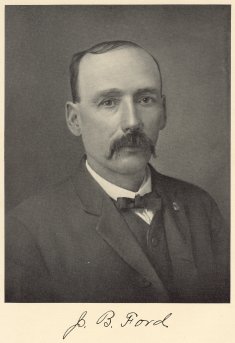

p. 919
J. B. FORD. In every community, town and city, no matter how much public-spirited feeling may exist, the work of taking the initiative and pushing ahead always devolves upon a willing few. Foremost among the public-spirited citizens of Harrisburg, Illinois, who took the initiative and have produced results that have contributed to the general welfare is J. B. Ford, president of The J. B. Ford Lumber Company, Incorporated, a brief sketch of whose life is as follows:
J. B. Ford, although a native of New York state, passed his boyhood days on the frontier in the Middle West, Iowa, Michigan and Illinois. As a young man he taught school in these states, and it was as a school teacher that he first came to Saline county, Illinois. He had prepared himself for this work by a course in the State Normal School at Ypsilanti. In 1881 he was a teacher in the Harrisburg schools, and for thirty years his influence in various ways has been a prominent factor in the upbuilding of the city. As manufacturer and contractor and builder, there are substantial evidences of his work on every hand;
p. 920
as chief executive of the town, his administration was one marked by many desirable and permanent improvements.
Mr. Ford's large lumber and contracting business may be said to have had its inception here in 1884, when he and Mr. N. Johnson opened a repair shop and in a small way manufactured wagons. To this business they soon added a planing mill. Two years later there was a division of the business, Mr. Ford taking the lumber machinery and starting a new business. Soon L. A. McGuire, a dealer in pine lumber, became his partner and they consolidated; and for three years they continued together. Then another division took place. Mr. McGuire took the finished stock and started another yard, while Mr. Ford retained the mill and worked up the rough stock. At that time this was the only planing mill in Saline county.
In 1893, his lease having expired, Mr. Ford moved to his present location. Here, in the heart of the city, he bought six acres, for which he paid $500. This property is to-day worth no less than $20,000. Immediately he built a new planing mill and enlarged the business, and two years later he added a sawmill, a standard double mill, the plant demanding a $15,000 investment. At that time timber was cheap; in some instances it being burned in order to clear the land. Mr. Ford saw his opportunity and made the most of it. From one forty-acre tract of timber land, which he purchased for $25.00, he had a yield of 200,000 feet of lumber. The home market was good, and in order to meet the demand he employed about twenty-five men and kept his mill running day and night. When timber began to get scarce he bought up all he could handle in the next three years, and before this was worked up it had doubled in value. While for several years he did business on borrowed money, he kept his credit good, and he had the keen foresight to make provision for the panic of 1893. Even then, however, he had hard work to keep the business going.
About 1895 Mr. Ford became interested in contracting and building. He became associated with Robert King, a bricklayer and brick manufacturer, and together they carried on building in connection with the manufacture of builders supplies up to the time of Mr. King's death. They erected the principal buildings of the town, including grade schools and high school, churches, banks, court house, business blocks and fine residences, and also put up many buildings in other towns, regularly employing from fifty to one hundred men. When the business had grown sufficiently to demand increased capital, Mr. Ford decided to incorporate, which he did in 1906, under the name of The J. B. Ford Lumber Company, Incorporated, with a capital stock of $55,000, for the manufacture of lumber, brick and tile and to deal in lumber and do general contract work. The company is officered as follows: J. B. Ford, president; A. O. Bennett, secretary and treasurer; and J. H. Mallone, general manager. In 1906 the annual business of the company was $140,000; this year (1911) it is $200,000. Two hundred men are employed, twenty-five to thirty being in the brick plant, and the pay roll averages $1,200 per week. At the time the company was incorporated, it was Mr. Ford's intention soon to retire, but he is still actively identified with the business and no date has been set for his retirement. He is a stockholder and director in the McClure-Flannigan Wholesale Grocery Company, and a director and vice president of the State Savings Bank, both of Harrisburg, and is the owner of much valuable property here.
In 1908 he was elected and served as mayor of Harrisburg, and during his incumbency of this office was the means of introducing valuable improvements in the town, including sewers and pavements.
p. 921
Also during his term the city was well policed and the debt was reduced $8,000.
Mr. Ford married, in 1886, Miss Guard, daughter of Alexander Guard, an extensive land owner and one of the pioneers of Equality, Gallatin county, now deceased. Mr. Guard was a son of Timothy G. Guard, who was the builder of the Illinois Iron Furnace. Mr. and Mrs. Ford have three sons: Eugene, Charles, and Dayton. Charley is in business with his father, having charge of the brick yard, and Eugene is the proprietor of a hotel at Benton, Illinois.